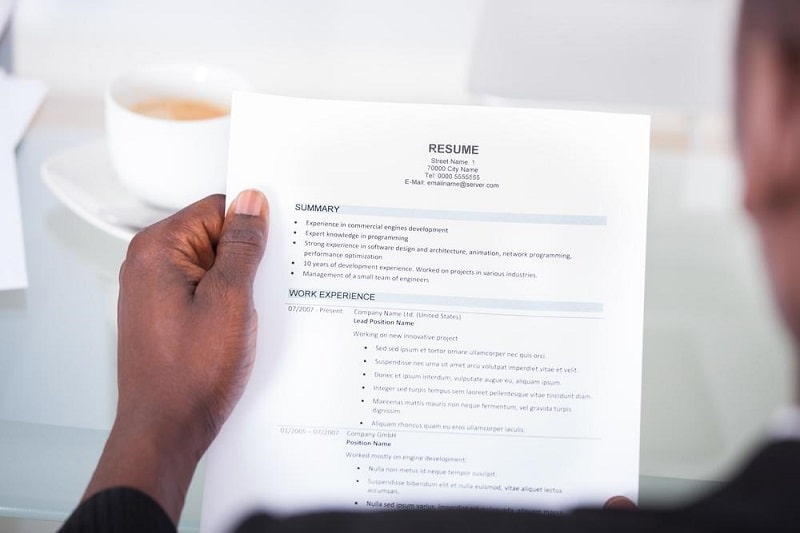You can write a CV in easy steps, but what is the ideal length? Most of the time, a one page resume is perfect. Regardless, a resume can be much longer if you have several years of experience under your belt. However, note, you only have to exceed the one-page limit if you cannot manage to fit everything within a single page.

Should a Resume Be One Page: Case Specific Use
A one-page resume is ideal for anyone who wishes to join the workforce as an entry-level applicant, on the one hand. On the other, your CV should be longer than a page if you have work experience that spans over ten years. If you apply for a position that requires 10+ years of experience, it is also best to write a multi-page resume. This way, you will communicate your work-related qualifications and achievements more effectively.
To recap everything, let’s answer some pressing queries on the issue:
- Is a two page resume bad? No. Write a longer CV if you are applying for a role that needs 10+ years of work experience.
- When should you write a single page resume? Every other time you write a job application. Such resumes standout, are more approachable and are easier to read.

How to Shorten a Resume Like a Pro
Over time, one-page CVs have proven to be more effective. In fact, the majority of hiring managers prefer single-page resumes over multiple page resumes. So, if you want one of your own, below is a comprehensive guide to help you know how to craft the perfect single page resume. It’ll be of much help if you can’t fit resume on one page.
1. Tailor Your CV for Every Position
It is entirely fine to have several pages of work-related achievements. Nonetheless, avoid writing all of them on your resume except when applying for mid- and senior-level positions. You should tailor your CV to match the role that you want. Do this by identifying three to five accomplishments that match the opening. This way, you will avoid listing irrelevant things that take up a lot of space.
2. Make Your Bullet Points Short
To save space, avoid writing paragraphs. Instead, make use of bullet points to highlight your qualifications, achievements, and experience on the CV. And while writing the bullet points, be sure to make them very short. Ideally, make them one or two lines each, while ensuring that they are precise and punchy.
3. Include Few Bullet Points on Your CV
Do not go overboard with the bullet lists. All the while, try to limit bullet points for each previous position held to three and at most five. This way, you will save much space. Of importance is to use bullets to highlight only a few of your best measurable accomplishments. Remember, they should all be relevant to the role you want.
4. Emphasize on Your Outstanding Accomplishments
You might have a lot of achievements to tell. However, your potential boss does not need to know about each of them. So, you have to scheme through your past accomplishments thoroughly and eliminate any redundant ones. Alternatively, you can learn how to include multiple positions and promotions on your resume.
5. Reduce the Education Section
Experience holds more weight than education, unless when applying for an entry-level role or internship in 2019. As an experienced candidate, you only need to list two or three bullet points in your education section. Nonetheless, you can include any job-related training in this section.
6. Avoid Using the Templates in MS Word
Do not use the one-page CV templates in MS Word as they might turn out longer on a recruiter’s PC. On a side note, be sure to write a CV in PDF format as it will not change in another machine.
7. Avoid Listing References on Your CV
It is typical to find applicants including "references available upon request" at the lower part of their CVs. So, by eliminating this part, you can save space and manage to fit your resume on a page.

8. Make your Summary Brief
If you are creating a one page resume, you have to make your resume summary short and to the point. If you write 8-10 long sentences with a bullet point list to boot, it will no longer be a summary. Furthermore, it will take up too much space in your resume. Stick to 3-5 short sentences instead.
9. Show Your Accomplishments
Rather than writing about your job descriptions, talk about the accomplishments you’ve made. These include successful projects you have been a part of, challenges you’ve helped your company overcome, money and time you have saved, etc. Discuss the ways you’ve used your skills to better your company.
10. Use a Smaller Font
You may use a smaller font when writing a resume that is one or two pages long. Slightly minimizing your font will give you more room to sell your qualities. But make sure it is not too tiny for the hiring manager to read.
11. Try Out Smaller Margins
A small margin will help you in saving space so that you can stay within the limits of a single page. However, like fonts, you shouldn’t make your margins too small. Remember, white space will make your resume easy to read.
12. Be Creative with Your Resume Format
If you want to fit more information, experiment with different resume formats and layouts, or multiple columns. Check out a variety of templates before you create resume to see which one goes well with you. If after all this, your resume still doesn’t fit one page, start looking for things you can remove from your resume entirely.

What Not to Include in One Page Resumes
If you find that your resume is too long to fit on one page, there are several things you can cut out to help you achieve your goal. Some of these include:
1. Your Address
Often, mentioning a full address is not required in a resume. You can, therefore, skip it in your resume. By leaving out your full address, you save the hiring manager time and declutter your resume. Just write the city when the position you hope to get is, and that’s it.
2. High School Education
Including your high school diploma in the education section of your resume isn’t necessary if you have higher educational achievements to talk about. Only include it if you have trouble filling your one or two page resume.
3. Irrelevant and Older Jobs
Any job that you held over ten years ago should be left out of your current resume. Also, positions that are in no way related to the role you are applying for have no place in your resume. You may talk about old work experience if you are unable to fill your single page resume. But, make sure to focus on achievements from those previous jobs that relate to the new role.
4. List of References
If you’re running out of space, it’s best to leave out references or the ‘references upon request’ statement. The hiring manager knows they can always ask you for them if they need to. Adding this section will only take up space that you could make better use of.
5. Other Less Important Information
Other sections like hobbies and interests, additional activities, volunteering, etc. are great when you are writing your first resume with no job experience. However, you can drop these details to create space for more relevant achievements in your one page resume.
To conclude, know when to write single page resumes. If you’re applying for a role that’s asking for ample job experience and you have it, you can create your resume in two pages. Discuss the best skills, achievements, and experience that fits the job offer and leave out the rest.